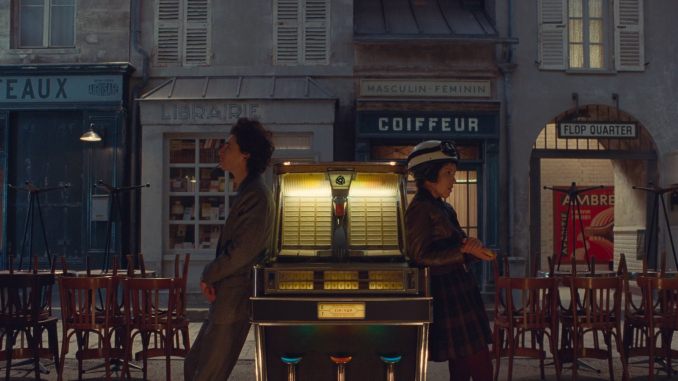
Wes Anderson’s latest feature, The French Dispatch (2021), is an anthology modeled on an issue of fictional magazine (whose name is shared with the film’s title) that itself is modeled after The New Yorker. More than ever Anderson’s influences are transparent, worn on the sleeve, as some token badge of “hipster cool”. The content on which the director hangs his cultural credentials is a hollow, episodic shell. The emotions that live in the symmetrical world of The French Dispatch simply do not exist.
Emotion is, however, suggested by a signifier that is wholly French in its cinematic significance; the single tear. Jeffrey Wright, Léa Seydoux, Frances McDormand, and Timothée Chalamet are but a few of the leads who are required to employ this tactic. It’s a loaded signifier whose two most important appearances in cinema are in highly influential masterpieces: Dreyer’s La Passion de Jeanne d’Arc (1928) and Godard’s Vivre sa vie (1963). In the two films that The French Dispatch references this moment of emotional fragility and surrender to self-annihilation are earned in traditionally dramatic performances within psychologically wrought melodramas. For Wes Anderson these moments, utilized as a motif in his film, have all the dramatic weight of his glib musical cues.
And what of the music in The French Dispatch? In his typical fashion Anderson uses a jukebox soundtrack to do the emoting. Here it’s Chantal Goya who, ala Jean-Luc Godard, must cue the viewer into the romantic content of the scene. This auditory plastic veneer that glosses over Anderson’s various vignettes adds to the detached theatricality of the proceedings. The music, as much as the beautiful sets, suggest that what’s happening on screen is little more than one of Max Fischer’s lavish productions. Has this mode of aesthetic operations become a self-reflexive strategy by which the artist interrogates his own style or is Anderson just doing the same old thing time and again because he hasn’t had anything to say in over fifteen years?
From Jacques Tati to François Truffaut to Jean-Pierre Gorin to Georges Franju and beyond the stylistic shifts afforded each episode of The French Dispatch culminates as a love letter to classic French Cinema. Each pastiche of a more accomplished filmmaker merely suggests that Anderson isn’t sure what his satire is meant to prove or convey. The sections “Revisions To A Manifesto” and “The Private Dining Room Of The Police Commissioner” each do something different with the narrator’s voice and perspective but without any payoff other than in their inherent juxtaposition.
Ultimately Wes Anderson is a filmmaker of monumental style and absolutely no substance and maybe that’s how The French Dispatch should be taken. Perhaps the pretentiousness of The French Dispatch is unintentional and it really is meant to be nothing more than a candy colored spectacle of the French cinema’s “greatest hits”. Maybe Anderson’s cavalcade of cinematic quotations isn’t meant to make viewers wish they were watching a better movie but are instead simply the joyous celebrations of a naive snob.
